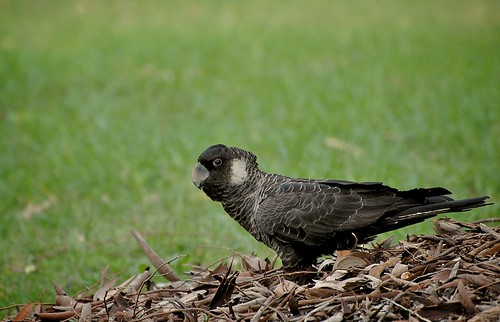Carnaby's black cockatoo $360,000 study grant
 Wednesday, July 15, 2009 at 9:32
Wednesday, July 15, 2009 at 9:32  Carnaby's black cockatoo. Image by HelenTHE endangered Carnaby's black cockatoo has been thrown a $360,000 lifeline in funding to study the bird's nesting areas.
Carnaby's black cockatoo. Image by HelenTHE endangered Carnaby's black cockatoo has been thrown a $360,000 lifeline in funding to study the bird's nesting areas.
The nesting and living habitats of the Carnaby's black cockatoo will be surveyed and plotted to better inform developers and planners of areas in need of conservation.
In just four decades populations of Carnaby's black cockatoos have plummeted - pushing the birds to the brink of extinction.
Development and land clearing in the state's southwest has wiped out 30 per cent of the species.
Environment Minister Donna Faragher said: “About 15,000 of the nomadic birds are estimated to visit the Swan Coastal Plain, however, a concentrated effort from a variety of stakeholders and the community is needed.”
The funding comes as part of the State Government's $3.5 million Natural Resource Management project.
Planning Minister John Day said one of the project's major objectives was to develop a geographic information system tool that would assist both conservation and land use planning while ensuring there is adequate and appropriate habitat for Carnaby’s black cockatoos in the Swan, Avon and South Coast regions.
"This project will provide benefits for the interface between planning and the environment by providing a clearer understanding of land use pressures and constraints,” Mr Day said.
“It will allow more informed planning to take place by providing valuable information on Carnaby’s black cockatoo habitats as part of the planning decision process.”
Australian property development advocacy group The Urban Development Institute of Australia (UDIA) said the funding is a relatively small step towards solving development problems associated with the cockatoos.
“Minister Day has noted that the project will provide benefits for the interface between planning and environment,” UDIA CEO Debra Goostrey said.
“While this information and mapping is critically important for future development, there is an immediate need for better integration of planning and environmental decision making when it comes to development approvals.”
“With potentially three different approval agencies involved on significant environmental issues such as the Carnaby’s Cockatoo, there is uncertainty about if and when a final decision on a development will be reached,” Ms Goostrey said.
Mrs Faragher said the project would include a survey of the potential breeding sites to help learn more about which nesting sites are active and therefore most valuable.
There would also be digital maps and information on what to plant to create Carnaby’s habitat.
All survey information, which will be finalised by the middle of 2010, will be made available online through DEC and the Department of Planning.

